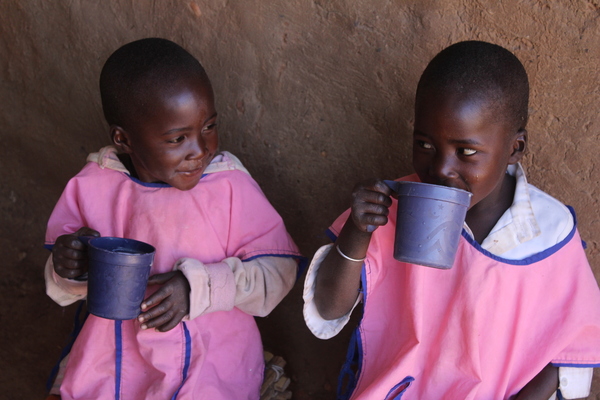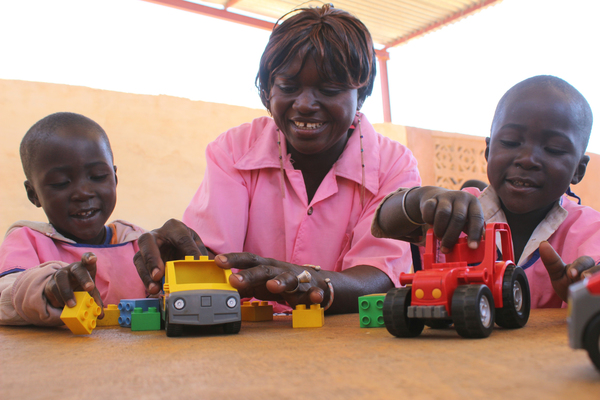(只有英文)马里学前教育及超级父母让幼儿健康成长
2017-03-06
© UNICEF/UN053039/Luthi
Tandou Ouologuem plays with her six-month-old baby Mariam Samba at her home in the village of Siby-Siby, central Mali. Tandou attended parental education classes provided by the NGO BorneFonden with support from UNICEF to learn how to play and stimulate her baby.
(只提供英文版本)
By Eliane LuthiIn central Mali, a new preschool is teaching children and parents the benefits of early childhood education, play, healthy eating and hygiene.
SIBY-SIBY, Mopti region, Mali/ HONG KONG, 6 March 2017 – In the small farming village of Siby-Siby in central Mali, parents don't have a lot of toys for their children to play with at home.

© UNICEF/UN053038/Luthi
Tandou plays a simple game of catch using pebbles with her twins Housseny (centre) and Hassana. When parents ing in sources of stimulation like games, they can pique children's curiosity, giving them an appetite to learn and discover the world around them.
“They make do with what they have... The kids play the drums with calabashes, they count using pebbles, they try to make castles out of the sand. Some parents put holes into a calabash to make an instrument out of it,” says village resident and preschool educator Kadidia Karambe.
One of those innovative parents is Tandou Ouologuem, who is great at improvising games with whatever she has at hand. When her twin sons come home, she plays a simple game of catch with them, using light pebbles. Housseny and Hassana, 4 years old, shriek with delight when they catch one.
Ever since they turned 3, Housseny and Hassana have been attending the Centre de développement de la petite enfance of Siby-Siby, an early childhood centre supported by H&M Foundation through UNICEF Sweden and in collaboration with the Ministry of Education and the NGO BorneFonden.
Tandou takes her boys by hand to the centre every morning, leaving them in Kadidia’s capable hands. There, with the help of Kadidia and the other volunteer educators in the centre, they learn the alphabet, numbers and counting, songs and recitations, and the names of different animals and plants. But they also spend time playing on swings and seesaws, and playing with building blocks, cars and other toys – building their social and teamwork skills, while stimulating their cognitive development. They also learn basic skills like handwashing and how to greet people.
At home, Housseny and Hassana show Tandou what they learned and continue learning with her.
“Playing with a kid, you understand them better,” explains Kadidia.
This part of Mali is famous for its onions. Tandou is one of the farmers that contribute to the region’s impressive production. She also grows tomatoes, lettuce and carrots. But despite her farming skills, before receiving parental education, she wasn’t always sure which types of food were best for her children’s health and growth.
Before, she prepared porridge for her children using several different types of cereals, but she did not add in much protein or ingredients rich in vitamins and minerals. Her newfound knowledge of food groups, learned during the parental education sessions, has helped her improve her recipe. “Now I only put millet and I add in powdered milk, baobab pulp and sugar,” she says.
The simple addition of vitamins, minerals, and proteins can go a long way in preventing child stunting, which affects as much as 26 per cent of all children in Mali. Children who are malnourished are often more tired, listless and less active than their well-nourished peers.

© UNICEF/UN053036/Luthi
Twins Housseny (right) and Hassana play on a seesaw with Kadidia at the early childhood development centre. With the help of Kadidia and other volunteer educators at the centre, children learn the alphabet, basic numeracy, and the names of different animals and plants.

© UNICEF/UN053037/Luthi
Twins Housseny (left) and Hassana eat enriched porridge prepared by their mother. After attending parental education classes, she started adding vitamins, minerals and protein to the porridge she prepares for her chlidren.
Providing children with balanced, nutritious meals is a first step to ensure healthy energy levels, and inging in sources of stimulation like games with parents can pique children's curiosity, giving them an appetite to learn and discover the world around them.
The new, enriched porridge is a hit with baby Mariam Samba, and even her twins – who have moved on to the general family diet – still slyly request a little taste of it.
Inspired by the parental education classes, Tandou also started improving the hygiene in her home, including washing and drying the dishes properly to ensure cleanliness. Her children, too, are cleaner: they wash their faces every morning, without their mother having to tell them to do so. These simple gestures of hygiene in the home can go a long way in preventing childhood illnesses like diarrhoea.
“Malaria is common here, as are diarrhoea and respiratory infections,” says Ogotenbelou, a volunteer community health worker in Siby-Siby. “The kids that come here wash their hands before and after eating. There is also more awareness about childhood illnesses: before, parents didn't ing their kids to the health centre if they were sick, but now they do it on the first day.”
Lamine Traoré, the director of the Centre d’Animation Pédagogique that oversees public school structures in the region, applauds the immediate impact the arrival of this type of preschool has had on primary school enrolment.
“It works wonders. We used to go door to door to encourage parents to enrol children in school. The enrolment into first grade has improved since the centres exist. There is a real increase in the enthusiasm of children and parents for school here.”
In Mali, only 5 per cent of children benefit from early childhood development programmes. “One of the consequences of this,” says Fabio Manno, Education Specialist at UNICEF Mali, “is that children often start primary school without any kind of previous knowledge. Increasing opportunities for early learning increases school readiness, meaning children arrive in primary school ready to learn and to do well.”
Back in the centre, Housseny and Hassana play with building blocks and cars with Kadidia. In a year’s time, they will be ready to start primary school. And thanks to their attentive mother and their dedicated volunteer educator, they are equipped to not just start school, but to excel when they get there.

© UNICEF/UN053035/Luthi
Watched by Kadidia (centre) twins Housseny (left) and Hassana play with building blocks and toy cars at the early childhood development centre in Siby-Siby, central Mali.









